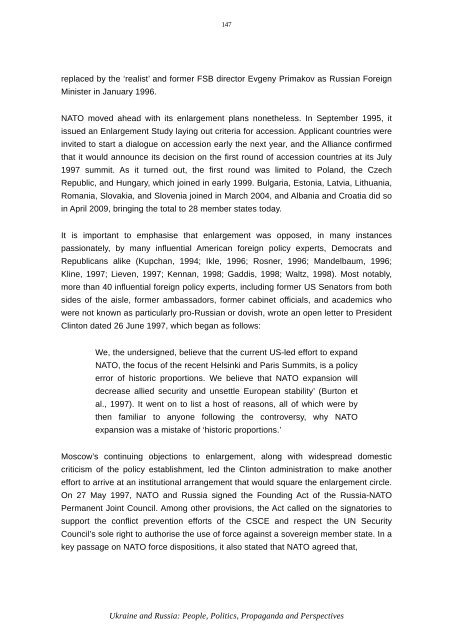Ukraine-and-Russia-E-IR
Ukraine-and-Russia-E-IR
Ukraine-and-Russia-E-IR
You also want an ePaper? Increase the reach of your titles
YUMPU automatically turns print PDFs into web optimized ePapers that Google loves.
147<br />
replaced by the ‘realist’ <strong>and</strong> former FSB director Evgeny Primakov as <strong>Russia</strong>n Foreign<br />
Minister in January 1996.<br />
NATO moved ahead with its enlargement plans nonetheless. In September 1995, it<br />
issued an Enlargement Study laying out criteria for accession. Applicant countries were<br />
invited to start a dialogue on accession early the next year, <strong>and</strong> the Alliance confirmed<br />
that it would announce its decision on the first round of accession countries at its July<br />
1997 summit. As it turned out, the first round was limited to Pol<strong>and</strong>, the Czech<br />
Republic, <strong>and</strong> Hungary, which joined in early 1999. Bulgaria, Estonia, Latvia, Lithuania,<br />
Romania, Slovakia, <strong>and</strong> Slovenia joined in March 2004, <strong>and</strong> Albania <strong>and</strong> Croatia did so<br />
in April 2009, bringing the total to 28 member states today.<br />
It is important to emphasise that enlargement was opposed, in many instances<br />
passionately, by many influential American foreign policy experts, Democrats <strong>and</strong><br />
Republicans alike (Kupchan, 1994; Ikle, 1996; Rosner, 1996; M<strong>and</strong>elbaum, 1996;<br />
Kline, 1997; Lieven, 1997; Kennan, 1998; Gaddis, 1998; Waltz, 1998). Most notably,<br />
more than 40 influential foreign policy experts, including former US Senators from both<br />
sides of the aisle, former ambassadors, former cabinet officials, <strong>and</strong> academics who<br />
were not known as particularly pro-<strong>Russia</strong>n or dovish, wrote an open letter to President<br />
Clinton dated 26 June 1997, which began as follows:<br />
We, the undersigned, believe that the current US-led effort to exp<strong>and</strong><br />
NATO, the focus of the recent Helsinki <strong>and</strong> Paris Summits, is a policy<br />
error of historic proportions. We believe that NATO expansion will<br />
decrease allied security <strong>and</strong> unsettle European stability’ (Burton et<br />
al., 1997). It went on to list a host of reasons, all of which were by<br />
then familiar to anyone following the controversy, why NATO<br />
expansion was a mistake of ‘historic proportions.’<br />
Moscow’s continuing objections to enlargement, along with widespread domestic<br />
criticism of the policy establishment, led the Clinton administration to make another<br />
effort to arrive at an institutional arrangement that would square the enlargement circle.<br />
On 27 May 1997, NATO <strong>and</strong> <strong>Russia</strong> signed the Founding Act of the <strong>Russia</strong>-NATO<br />
Permanent Joint Council. Among other provisions, the Act called on the signatories to<br />
support the conflict prevention efforts of the CSCE <strong>and</strong> respect the UN Security<br />
Council’s sole right to authorise the use of force against a sovereign member state. In a<br />
key passage on NATO force dispositions, it also stated that NATO agreed that,<br />
<strong>Ukraine</strong> <strong>and</strong> <strong>Russia</strong>: People, Politics, Propag<strong>and</strong>a <strong>and</strong> Perspectives


